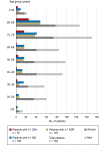Adverse drug events in older patients admitted as an emergency: the role of potentially inappropriate medication in elderly people (PRISCUS)
- PMID: 23596501
- PMCID: PMC3627162
- DOI: 10.3238/arztebl.2013.0213
Adverse drug events in older patients admitted as an emergency: the role of potentially inappropriate medication in elderly people (PRISCUS)
Abstract
Background: Lists of potentially inappropriate medications (PIMs) for the elderly, such as the German PRISCUS list, have been published as expert recommendations with the aim of improving drug safety for this patient group. In this study, we tried to determine how often adverse drug events occur in the emergency department and what role PRISCUS medications might play in these events.
Methods: We prospectively reviewed the medical records of 752 patients who were treated in the emergency department (ED) of a level III hospital in Germany for adverse drug events due to medication errors (MEs) and for adverse drug reactions (ADRs). The evaluation was performed in two steps by pharmacologists, clinical pharmacologists, and board-certified internists.
Results: Both clinically important MEs and ADRs became more common with advancing age. Among the 351 patients who were over age 65, 307 (87.5%) were taking at least one medication at home. Of these 307 patients, 16.6% (95% confidence interval [CI]: 12.9-21.2%) were taking at least one PIM, as defined by the German PRISCUS list. In relative terms, PIMs were more commonly associated with ADRs or MEs than other drugs (27.0% [95% CI: 17.5-39.1% versus 15.7% [95% CI: 14.1-17.4%], Odds ratio 1.99 [95% CI: 1.23-3.52: p = 0.018), but in absolute terms ADRs and MEs involved non-PIM more often than PIM.
Conclusion: Elderly patients more frequently suffer from ADR and from the clinical consequences of medication errors. Elderly patients taking PIMs are more likely to suffer from ADRs and MEs, even though most drug-related events are still attributable to non-PIM.
Figures


Comment in
-
Adverse drug events in older patients admitted as an emergency: the role of potentially inappropriate medication in elderly people (PRISCUS). Study design.Dtsch Arztebl Int. 2013 Oct;110(40):674. doi: 10.3238/arztebl.2013.0674a. Dtsch Arztebl Int. 2013. PMID: 24167525 Free PMC article. No abstract available.
-
In reply.Dtsch Arztebl Int. 2013 Oct;110(40):674. doi: 10.3238/arztebl.2013.0674b. Dtsch Arztebl Int. 2013. PMID: 24167526 Free PMC article. No abstract available.
References
-
- Budnitz DS, Lovegrove MC, Shehab N, Richards CL. Emergency hospitalizations for adverse drug events in older Americans. N Engl J Med. 2011;365:2002–2012. - PubMed
-
- Budnitz DS, Shehab N, Kegler SR, Richards CL. Medication use leading to emergency department visits for adverse drug events in older adults. Ann Intern Med. 2007;147:755–765. - PubMed
-
- Lau DT, Kasper JD, Potter DE, Lyles A, Bennett RG. Hospitalization and death associated with potentially inappropriate medication prescriptions among elderly nursing home residents. Arch Intern Med. 2005;165:68–74. - PubMed
-
- Chrischilles EA, VanGilder R, Wright K, Kelly M, Wallace RB. Inappropriate medication use as a risk factor for self-reported adverse drug effects in older adults. J Am Geriatr Soc. 2009;57:1000–1006. - PubMed
Publication types
MeSH terms
LinkOut - more resources
Full Text Sources
Other Literature Sources
Medical
Research Materials
Miscellaneous

